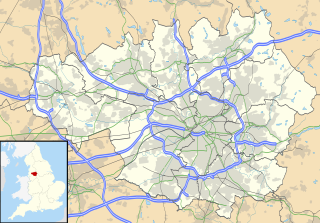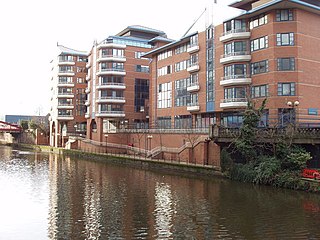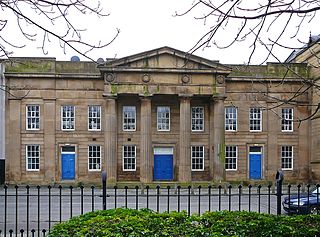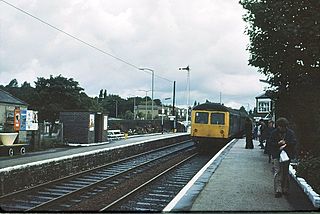
Salford is an area of Greater Manchester, England, west of Manchester city centre in a meander of the River Irwell, which forms part of its boundary with Manchester.

William Henry Smith, FRS was an English bookseller and newsagent of the family firm W H Smith, who expanded the firm and introduced the practice of selling books and newspapers at railway stations. He was elected a Member of Parliament in 1868 and rose to the position of First Lord of the Admiralty less than ten years thereafter. Because of his lack of naval experience, he was perceived as a model for the character Sir Joseph Porter in H.M.S. Pinafore. In the mid-1880s, he was twice Secretary of State for War, and later First Lord of the Treasury and Leader of the House of Commons, among other posts.

Eccles is a town in the City of Salford Greater Manchester, England, 2.7 miles (4.3 km) west of Salford and 3.7 miles (6.0 km) west of Manchester city centre, between the M602 motorway to the north and the Manchester Ship Canal to the south.
The East Lancashire Railway operated from 1844 to 1859 in the historic county of Lancashire, England. It began as a railway from Clifton via Bury to Rawtenstall, and during its short life grew into a complex network of lines connecting towns and cities including Liverpool, Manchester, Preston and Blackburn.

The rural Entwistle railway station first opened in 1848 is 5 3⁄4 miles (9.3 km) north of Bolton. It is the closest station to Edgworth. Unlike nearby Bromley Cross the station lies outside the Transport for Greater Manchester boundary, meaning that passengers cannot take advantage of their special offers and ticketing. Owing to the remote location and low passenger numbers, Entwistle has been a request stop for several years. It is served by Northern services on the Manchester Victoria/Bolton 'Ribble Valley' Line towards Blackburn and Clitheroe in England.

Eley Brothers were a manufacturer of firearms cartridges at the Eley's Cartridge Factory, located in Edmonton and bordered by the River Lee Navigation and the Great Eastern Railway at Angel Road.
Alexander Tom Cussons. Born in Holbeck, Leeds, England to Thomas Tomlinson Cussons (1838–1927) and his wife Elizabeth Cussons. Alexander was the Chairman of Cussons Sons & Co, the largest independent soap manufacturer in Britain and maker of the brand Cussons Imperial Leather and other personal care products.

Hans Renold was a Swiss/British engineer, inventor and industrialist in Britain, who founded the Renold manufacturing textile-chain making business in 1879, and with Alexander Hamilton Church is credited for introducing scientific management also known as Taylorism to England.
Mather & Platt is the name of several large engineering firms in Europe, South Africa and Asia that are subsidiaries of Wilo SE, Germany or were founded by former employees. The original company was founded in the Newton Heath area of Manchester, England, where it was a major employer. That firm continues as a food processing and packaging business, trading as M & P Engineering in Trafford Park, Manchester.

The Manchester and Bolton Railway was a railway in the historic county of Lancashire, England, connecting Salford to Bolton. It was built by the proprietors of the Manchester, Bolton and Bury Canal Navigation and Railway Company who had in 1831 converted from a canal company. The 10-mile (16 km) long railway was originally to have built upon most of the line of the canal, but it was eventually built alongside the Salford and Bolton arms of the canal. The Act of Parliament also allowed the construction of a connection to Bury, but technical constraints meant that it was never built.
Harry Stokes was a master bricklayer, beerhouse manager and special constable in Manchester. He was assigned a female gender at birth but lived as a man. Harry had two long term relationships with women, both of which lasted over 20 years. In 1838 and 1859 his gender variance became the subject of local and national newspaper articles in which he was described as a 'man-woman’ and a ‘female husband’.

W & J Galloway and Sons was a British manufacturer of steam engines and boilers based in Manchester, England. The firm was established in 1835 as a partnership of two brothers, William and John Galloway. The partnership expanded to encompass their sons and in 1889 it was restructured as a limited liability company. It ceased trading in 1932.

Olivia Francisca Buckley née Dussek (1799–1847) was an English harpist, organist and composer. She was born in London, the daughter of Czech composer Jan Ladislav Dussek and Scottish composer Sophia Corri. Dussek left his wife, and Olivia was taught harp and piano by her mother, making her debut at the age of eight at the Argyle Rooms. She married Richard William Buckley and had ten children.
Architectural Ironmongeryor is a term used for the manufacture and wholesale distributor of items made from iron, steel, brass, aluminium or other metals, including plastics, for use in all types of buildings. The Architectural Ironmongery range includes door handles, closers, locks, cylinder pulls and hinges, window fittings, cupboard fittings, iron railings, handrails, balustrades, switches and sockets.

William Langton (1803–1881) was an English banker in Manchester, known also for antiquarian and philanthropic interests.
Emily Fleeshman is an English actress. She is most widely known for her roles as Nikki in Still Open All Hours and Sally in Moving On.
Sophia Goulden was the mother of Emmeline Pankhurst and is credited with having an important forming influence on her daughters’ political beliefs.

Samuel Ellis and Company was a British engineering company, based in Salford, Manchester. It operated, in various form, from 1832 to 1887.

















